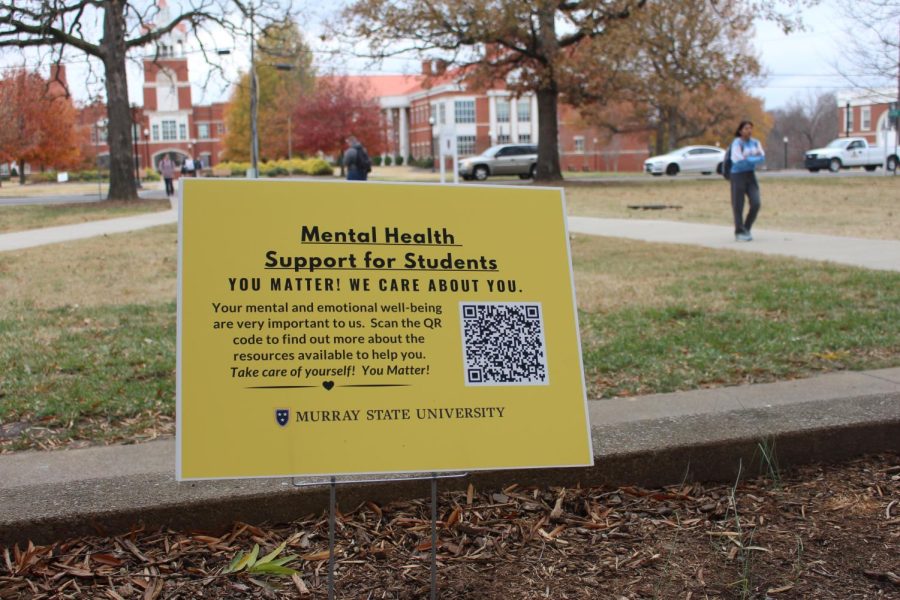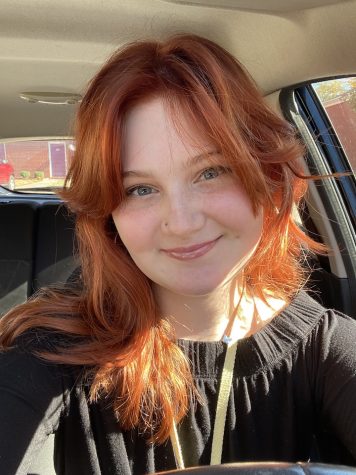‘You Matter’ signs spotlight mental health
The ‘You Matter’ signs are placed throughout campus with a QR code that takes scanners to the Mental Health and Emotional Well-Being tab of murraystate.edu. (Dionte Berry/The News)
December 1, 2022
Gold signs around campus exclaim “You Matter! We Care About You.” and encourage students to learn about the mental health resources available to them through a QR code that links to murraystate.edu/mental health for a list of resources, both on and off campus.
The Office of Student Engagement and Success, in collaboration with the Quality Enhancement Plan (QEP) Topic Development Team, planned this initiative.
Peggy Whaley, director of Student Engagement and Success, said she noticed students are not always aware of on-campus resources for mental health.
“Our biggest hope is really just encouraging students to familiarize themselves with the resources,” Whaley said. “Part of it is really making sure that there’s an awareness but also an increased utilization of [the resources.] And just helping them know that we do care about them, and they do matter, and we’re here to help.”
Students were struggling with mental health and general well-being coming back from the pandemic, Whaley said.
The biggest trend she’s noticed is more involvement on campus overall since the University’s mask mandate was repealed. Last year, Racers Empower saw between 10-15 students, but at the last two events this year, attendance was at 25-30. The Fall Festival saw over 120 in attendance, and the Back to School Ice Cream Social had about 300 attendees.
“Many of us have to kind of learn how to socialize again,” Whaley said. “Making those connections and feeling that sense of belonging is really what helps students stay and want to be here and do well, academically and socially.”
The office also requests welfare checks from the Murray State University Police Department. Those have increased dramatically over the last few months, Whaley said. She hopes to see these decrease to see that the initiative is working.
To respond to these issues, she wanted to compile a list of resources for students. The office designed a webpage for on and off campus resources, placed the yard signs across campus and made business cards and rack cards. The webpage also includes information on financial literacy, Student Disability Services and the Wellness Center.
That turned into a “We Care” campaign, where “care” stands for “Caring About Racers Every (Day).”
This year’s Quality Enhancement Plan focuses on mental health and well-being.
The QEP is required for the University to be reaccredited with the Southern Association of Colleges and Schools (SACS).
Alyx Shultz, department head of Agriculture Science, started on the last QEP, “Bring Learning to Life,” as a development team member. She now serves as co-chair alongside Jamie Rogers, interim director of the School of Engineering.
“When Dr. Provine approached me about co-chairing this QEP with Jamie Rogers, it was an easy ‘yes,’” Shultz said.
This year’s QEP is not officially named yet, but it targets improvement of overall wellness and mental health.
The team sought input from each college and people in the community who hire students, Shultz said. They identified several potential topics and surveyed constituents who overwhelmingly responded they needed to do wellness/mental health as the QEP this time.
The Topic Development team meets every other week. So far, the team has identified its objectives and are working to develop implementation and assessment strategies. Later this semester, they’ll work to collect feedback from students on these ideas and for other needs within the student body.
Meanwhile, they’re working on the literature review and formal written plan that will be submitted to SACS for accreditation.
“The QEP is an effort that helps us as a campus community to be on a path of continual reflection, growth and improvement,” Shultz said.
Each cycle, the University selects a new topic. Each topic spans across five years. Other recent QEPs have been “Writing” and “Bring Learning to Life.”
Students can find evidence of past QEP efforts across campus. For example, the Racer Writing Center came directly from the “Writing” QEP. The “Bring Learning to Life” QEP included grant opportunities that faculty could use to increase hands-on learning within their programs and classes.
“My big hope for this year is to work with the Dev Team to create a QEP that benefits all our Murray State students and provides opportunities to help our faculty, staff and instructors create the most positive learning and living experience possible for students,” Shultz said.
To assemble the team, Rogers and Shultz met with each dean to request nominations for “great thinkers” within each college/school.
“In each meeting, we work hard to develop a strong, impactful QEP that maximizes benefits across campus, but we also have a bit of fun,” Shultz said. “Rarely do we as faculty, staff and instructors get to meet up with people from all across campus. This is our chance to do that. I think anyone on the committee would agree—it’s hard work, but it’s enjoyable.”
The Office of Student Engagement and Success also with parents with “We Care” boxes. Parents and family members can order a free self-care box for students from the office’s twice-a-month newsletter in the mental health resource section.
The boxes contain a personalized message from a family member, coloring book, pencils, chapstick, tissues, candy and more.
Whaley said the office has filled over 130 requests for self-care boxes since “We Care” started in September.
As part of the webpage that the QR code links to, suggestions for faculty are also included. At a back-to-school meeting, the office gave faculty a sheet of these mental-health-positive steps and ideas for them to consider within their classes.
“[Think] about, you know, are you setting a midnight deadline?” Whaley said. “Which for some students could cause them to stay up late trying to study and not get the rest they need—because getting enough rest is important.”
Offices on campus also close around 4:30 p.m. during the week, Whaley noted. She suggested faculty and staff be mindful of technology issues when setting deadlines. If a student needs to access the Service Desk, an earlier deadline would be more beneficial.
Faculty can also put the resources or the QR code in the syllabus to encourage conversation and submit notifications through the Starfish Success Network for struggling students.
“Let our office reach out and try to help so all of us together can help each other,” Whaley said. “And really what the focus is is students and making sure that they’re doing well and feeling good about their experience.”
To measure improvement or if this initiative is working, Whaley looks at usage of services on campus. If more people are using the resources, more people are getting the help they need. The office would see less referrals for mental health. The Counseling Center would possibly deal with a lot of issues, but the issues aren’t as severe.
Whaley said the office will also most likely survey students about their care boxes, asking if it helped or how it made them feel.
“I think the more we talk about mental health and well-being, the more it’s just kind of commonplace,” Whaley said. “It’s ingrained in us to take care of ourselves physically, but it’s equally important to take care of ourselves mentally, and there are little things we can do and bigger things we can do. But really it’s so important to take care of our mental health and well-being.”
Whaley encourages students to reach out to the office if they need help, no matter what the issue is.
“We’re here, as this is what we do,” Whaley said. “We help students, and they do matter, and we do care about them.”
To access Starfish or contact the Office of Student Engagement and Success, visit murraystate.edu/success.
emerywainscott@murraystate.edu





























































































